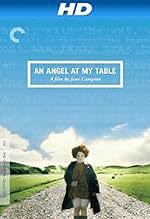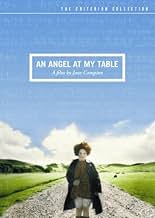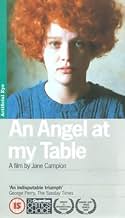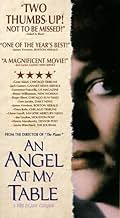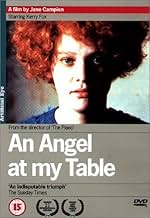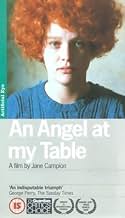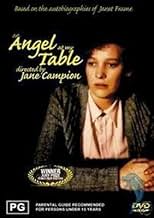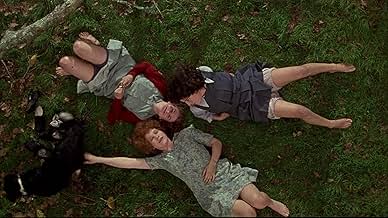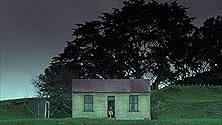IMDb-BEWERTUNG
7,4/10
9156
IHRE BEWERTUNG
Janet Frame war ein brillantes Kind, das als Teenager fälschlicherweise als schizophren diagnostiziert wurde. Erleben Sie Janets Entdeckung der Welt und ihr Leben in Europa, während ihre Büc... Alles lesenJanet Frame war ein brillantes Kind, das als Teenager fälschlicherweise als schizophren diagnostiziert wurde. Erleben Sie Janets Entdeckung der Welt und ihr Leben in Europa, während ihre Bücher unter großem Beifall veröffentlicht werden.Janet Frame war ein brillantes Kind, das als Teenager fälschlicherweise als schizophren diagnostiziert wurde. Erleben Sie Janets Entdeckung der Welt und ihr Leben in Europa, während ihre Bücher unter großem Beifall veröffentlicht werden.
- Auszeichnungen
- 19 Gewinne & 5 Nominierungen insgesamt
Kevin J. Wilson
- Father
- (as K.J. Wilson)
Empfohlene Bewertungen
For some people, "An Angel At My Table' would be a VERY long sit-through. The story of one of New Zealand's most famous authors, who succeeds despite having gone through schizophrenia isn't exactly family entertainment. But although the movie runs far too long, at 2 and a half hours, I found myself engaged quite a bit as soon as the story got moving, and not a relentless character study. Janette Frame, a girl with a serious shock of red hair, grows up, realizing her passion for writing, and suffers tremendous setbacks, both emotionally and professionally. What a performance the three actresses give as Janette, we see Janette as a young girl, a teenager, and as a young adult. Although Kerry Fox is the most well known of all three, all three are tremendous here, each taking the nuances of Frame, and developing the character beautifully. As per the case of all Jane Campion's films, she knows how to frame the camera quite well, and again, although the movie IS long, it does have a lot of amazing little moments
"An Angel at My Table" (1990) made by Jane Campion is a true life-story of Janet Frame (1924-2004), New Zealand's most famous author. The film starts with young Jane, a funny -looking red haired girl, shy and quiet who knew too well that she was "poor, smelly, and unpopular". Then it follows her to misdiagnosis of schizophrenia and more than 200 electroshock treatments in a mental hospital where she had spent eight years and a severe, lifelong shyness that was her only problem. Even in the hospital she was writing and was able to have her book published - writing did save her from losing her mind. The film is based on three of her memoirs, "To the Is-land", "An Angel at My Table" and "The Envoy from Mirror City".
Jane Campion made a very affecting and quietly powerful portrait of a writer who also was a gentle and genuinely humble woman. The film is never a sentimental manipulating story of a talented but misunderstood artist. It does not idealize Frame but it is a very honest and sympathetic portrait of an artist.
Jane Campion made a very affecting and quietly powerful portrait of a writer who also was a gentle and genuinely humble woman. The film is never a sentimental manipulating story of a talented but misunderstood artist. It does not idealize Frame but it is a very honest and sympathetic portrait of an artist.
"An Angel at My Table" (New Zealand, 1990): It's been three years since I've last watched this film. There is NO further reason to wonder if it should be in my "top" category. It is created by Jane Campion from the writer Janet Frame's autobiographies of her harrowing life. We join Janet during childhood, move through the teenage years and into adulthood, as she struggles for a place - ANY place - in the world...but deep down, writing is her one reliable love. Three actresses were needed for the role of Janet, and all do wonderful jobs, especially depicting someone who always feels on the outside, and longs to be included. Jane Campion, one of my favorite film makers, presents a powerful, subdued, and melancholy work of Art. It is not an amazing film due to every camera shot or the quality of sound recording
THIS work is great for its acting, and its story telling. It has as much emotion as one heart can hold for 157 minutes.
In the ambitious follow-up to her celebrated debut feature 'Sweetie' Jane Campion presents yet another social misfit at odds with an unsympathetic world, drawing her inspiration this time from the autobiography of Janet Frame, a New Zealand writer who suffered eight years of electro-shock therapy after being misdiagnosed for schizophrenia. The film is structured in the form of a triptych, with the best moments (perhaps not surprisingly) all clustered in the first episode, showing the young Frame's childhood in a poor but literate household, always at the mercy of adult authority: teachers, doctors, and so forth. These early scenes aren't exactly meant to set a cheerful mood, but they look positively giddy compared to the rest of the film, the length of which eventually overwhelms its subject: watching the drab and lonely life of a painfully shy, pathetically insecure, repressed and introverted writer unfold over 158 minutes can be an oppressive experience. Campion's unique visual style is never less than interesting, but her technique of using sudden blackouts to separate short, seemingly unrelated fragments of narrative memory only underscores the difficulty of capturing on film the creative process of a writer.
I discovered this incredible film by accident, if there are such things as accidents like this...I saw the title in a movie review book (and a very brief summary) and it intrigued me. Because I knew it was a New Zealand import from years ago, I never even bothered trying to locate a copy. So when it called out to me months later from the shelves in the video shop, I felt eerily compelled to rent it. I watched it by myself in the wee hours of the morning--and it could not have been more ideal.
An Angel at My Table is the story of New Zealand's famous writer, Janet Frame. Fairly long, but never boring, it is told in three 50 minute interludes, taking us through her impoverished childhood, awkward adolescence, and the terrifying and eventually triumphant years that follow: Janet was a plump little girl, with an unruly mop of bright red hair. She was fascinated with books and stories at an early age ~ a friend had lent her a copy of Grimm's which she treasured. A certificate of merit in grade school allowed her the use of the public library where she became even more immersed in literature. Despite financial hardships, her father managed to buy her a journal "for her writings." By her late teens she was no longer plump, but a rather crippling shyness had set in. At social functions she played the wallflower. She preferred to be by herself, where she could nurture her passion for creating stories. She went on to become a teacher (though the idea no longer appealed to her), and suffered a panic attack when a supervisor "sat in" on one of her classes. It was advised that Janet have a psychiatric evaluation--a misdiagnosis of schizophrenia (later changed to nothing more than shyness and depression) landed her in a mental institution for eight years of electric shock therapy, each session she narrated to be: "equal in fear to that of an execution." She was scheduled for a partial lobotomy when news reached her doctors that she had won a national literary award--during her hospitalization her sister had published a book of Janet's short stories. She was almost immediately released under the premise that a talented author couldn't possibly need the treatment she had been receiving....At this point Janet was in her late twenties, but her lengthy "exile" had given the impression that she was considerably younger than that. A friend of the family's, another writer who admired her work, offered her a cottage on his property so that she could write seriously in a distraction-free environment. She accepted the offer and her first completed work there was accepted soon after. European travels were arranged for her, more successful books were born, and fame attained...
I've heard it claimed that Janet had also attained happiness, but I am not sure that I agree. Janet had found numerous freedoms, emotional and financial and of course physical, but happiness? I believe that she had become comfortable with herself, and perhaps that in itself is a happiness. She never did fit into the surrounding world--but lived peacefully alone on the vaporous outskirts. A very supportive therapist in London had told her, "If people tell you that you should go out there and mix, and you don't feel like it,...don't." She took his words to heart.
I was surprised with the overall beauty of this film~I guess I should not have been~the director was Jane Campion (The Piano, Portrait of a Lady). The New Zealand landscapes and backstreets of Spain were gorgeously rendered, the accompanying score at times both capricious and melancholy. But above all, what struck me most, was how I identified with Janet. The plump and impoverished childhood, the obsession with writing, the painful shyness and reclusiveness. The life of the outsider~luckily minus the stay in the psychiatric ward. On some level I was Janet (or am Janet). And there is something oddly redemptive in finding a twin on screen or in a book, however juvenile the notion...
An Angel at My Table is the story of New Zealand's famous writer, Janet Frame. Fairly long, but never boring, it is told in three 50 minute interludes, taking us through her impoverished childhood, awkward adolescence, and the terrifying and eventually triumphant years that follow: Janet was a plump little girl, with an unruly mop of bright red hair. She was fascinated with books and stories at an early age ~ a friend had lent her a copy of Grimm's which she treasured. A certificate of merit in grade school allowed her the use of the public library where she became even more immersed in literature. Despite financial hardships, her father managed to buy her a journal "for her writings." By her late teens she was no longer plump, but a rather crippling shyness had set in. At social functions she played the wallflower. She preferred to be by herself, where she could nurture her passion for creating stories. She went on to become a teacher (though the idea no longer appealed to her), and suffered a panic attack when a supervisor "sat in" on one of her classes. It was advised that Janet have a psychiatric evaluation--a misdiagnosis of schizophrenia (later changed to nothing more than shyness and depression) landed her in a mental institution for eight years of electric shock therapy, each session she narrated to be: "equal in fear to that of an execution." She was scheduled for a partial lobotomy when news reached her doctors that she had won a national literary award--during her hospitalization her sister had published a book of Janet's short stories. She was almost immediately released under the premise that a talented author couldn't possibly need the treatment she had been receiving....At this point Janet was in her late twenties, but her lengthy "exile" had given the impression that she was considerably younger than that. A friend of the family's, another writer who admired her work, offered her a cottage on his property so that she could write seriously in a distraction-free environment. She accepted the offer and her first completed work there was accepted soon after. European travels were arranged for her, more successful books were born, and fame attained...
I've heard it claimed that Janet had also attained happiness, but I am not sure that I agree. Janet had found numerous freedoms, emotional and financial and of course physical, but happiness? I believe that she had become comfortable with herself, and perhaps that in itself is a happiness. She never did fit into the surrounding world--but lived peacefully alone on the vaporous outskirts. A very supportive therapist in London had told her, "If people tell you that you should go out there and mix, and you don't feel like it,...don't." She took his words to heart.
I was surprised with the overall beauty of this film~I guess I should not have been~the director was Jane Campion (The Piano, Portrait of a Lady). The New Zealand landscapes and backstreets of Spain were gorgeously rendered, the accompanying score at times both capricious and melancholy. But above all, what struck me most, was how I identified with Janet. The plump and impoverished childhood, the obsession with writing, the painful shyness and reclusiveness. The life of the outsider~luckily minus the stay in the psychiatric ward. On some level I was Janet (or am Janet). And there is something oddly redemptive in finding a twin on screen or in a book, however juvenile the notion...
Wusstest du schon
- WissenswertesKerry Fox gained two stones (12.7kg) for her role as Janet Frame. She managed this by drinking liters of Coca-Cola, eating packets of chocolate biscuits and going on the pill.
- PatzerThe streets of Ibiza have some features that surely were not present on the 50s, i.e., a "no parking" signal on one of the streets. Cars were very rare on the island those days.
- SoundtracksSomebody Stole My Gal
Written by Leo Wood
Performed by Pat McMinn with Crombie Murdoch and the Nickelodeons
Used by permission of D.F. Peach
Top-Auswahl
Melde dich zum Bewerten an und greife auf die Watchlist für personalisierte Empfehlungen zu.
- How long is An Angel at My Table?Powered by Alexa
Details
- Erscheinungsdatum
- Herkunftsländer
- Sprachen
- Auch bekannt als
- Ein Engel an meiner Tafel - Eine Trilogie
- Drehorte
- Produktionsfirmen
- Weitere beteiligte Unternehmen bei IMDbPro anzeigen
Box Office
- Bruttoertrag in den USA und Kanada
- 1.054.638 $
- Eröffnungswochenende in den USA und in Kanada
- 12.905 $
- 27. Mai 1991
- Weltweiter Bruttoertrag
- 1.055.995 $
- Laufzeit2 Stunden 38 Minuten
- Farbe
- Seitenverhältnis
- 1.66 : 1
Zu dieser Seite beitragen
Bearbeitung vorschlagen oder fehlenden Inhalt hinzufügen

Oberste Lücke
By what name was Ein Engel an meiner Tafel (1990) officially released in India in Hindi?
Antwort

